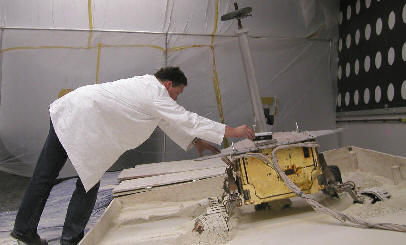 |
|
|
|
|
|
|||
|
By Steve Hall |
||||
 |
April 21, 2010 -
Seventy-six students from community colleges in 28 states and the This event is the culmination of the National Community College Aerospace Scholars pilot program. Students completed four Web-based assignments during the school year. Those who maintained a 95 average qualified for the experience at Johnson. |
|||
|
NASA will pay the students' travel expenses. They will apply what they
have learned during the year after interacting with NASA engineers and
learn more about careers in science and engineering. Program
participants will form teams and establish fictitious companies
interested in Mars exploration during the event. Each team will be
responsible for developing a prototype rover, designing a line drawing
of their rover, and forming a company infrastructure, including budget,
communications and presentations. The on-site experience includes a tour
of Johnson facilities and briefings from NASA employees, including
astronauts.
"This represents another innovative NASA project whereby community
college students engage in actual engineering design and production from
concept to build-out that simulate the process NASA uses in designing
robotic explorers for solar system destinations," said Joyce Winterton,
associate administrator for Education at NASA Headquarters in
The students represent |
||||
|
"NASA
is very proud of the outstanding work these students already have
completed, and we look forward to seeing their rover designs," said
Deborah Hutchings, the program manager at Johnson. "These students have
a unique opportunity to preview how a career in science, technology,
engineering or math can lead them on a journey of space exploration."
The National
Community College Aerospace Scholars is a pilot program based on the
Texas Aerospace Scholars, a program created by the state of With this program, NASA continues the agency's investment in the nation's students with a goal of attracting them to the science, technology, engineering and mathematics disciplines critical to NASA's future missions. |
| ©AvStop
Online Magazine
Contact
Us
Return To News
|
|
